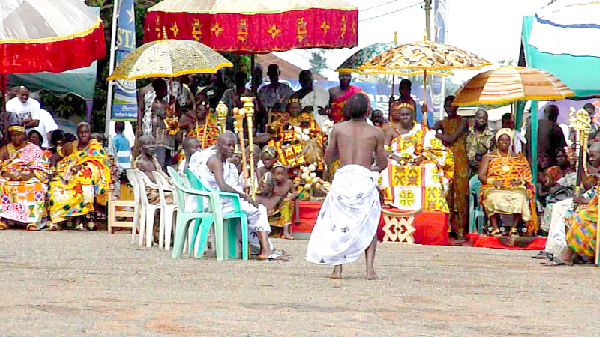
Breaking the silence of Ohum - A Christian perspective
Every year, one hears announcements before the Ga Homowo Festival about a ban on noisemaking.
These announcements have become notable because of the controversial responses of some churches which deem the ban as contrary to their religious creeds and practices.
Advertisement
As a religious leader and Bible researcher, I have been intrigued by this ban and wished to learn more about it. That was when I learnt that the pre-festival ban on noisemaking was not limited to Ga Homowo but was widespread and practiced as part of many other traditional cultural festivals.
I took advantage of the recent Ohum Festival, which is the major festival in Akyem Abuakwa, to observe this phenomenon in action. I travelled to Akyem Ati (new Tafo) on July 20, 2021 as a participant observer.
I chose Ati because of my roots in that town, where the Chief, Nana Ati Awuah Kwaako, is my cousin and my brother and cousins also occupy stools at the palace. Indeed, if I am fortunate I could become the first Nana Osofo in the palace!
I chose the Tuesday because it was the last day of the silence, which would be ritually broken a few minutes after six in the evening. In an interview with the Gyaasehene, Nana Addo Gyan, prior to the ending of the silence, he explained that the ban on noisemaking had lasted two weeks and reached its climax on the Tuesday when the ban applied to the pounding of fufu.
It has to be explained that in many Akan homes abstinence from fufu for a whole day amounts to a fast! The Gyasehene explained that the period of silence, also known as Adaebutu, was meant to be a period of reflection and sacrifice when people put aside their daily pleasures to concentrate on the good of the community.
Ban
As we have seen many times in Ghana, some church groups in some communities see the ban as an affront and an infringement on their religious rights. Indeed, in some instances, this stance has led to clashes between traditional authorities and suppliants of other faiths.
However, it has to be explained that the ban is not only for churches but for everyone living in the land, which means no funerals, parties, live music in bars and any other activity likely
to generate loud excitement, merrymaking and music. I began my research by making the chiefs and elders aware that I was there as a Christian pastor and Bible teacher and researcher eager to understand and learn about our cultural practices.
Of course some Christians believe that our cultural practices celebrate dead ancestors, idols and deities, who should not be invoked or worshipped, however, I had to be open minded and extremely respectful from the beginning, hoping like Paul the Apostle, to find a place reserved for my God, as he did among the Athenians who worshipped many gods.
I was careful not to repeat the mistake of some of the early missionaries, who threw away the baby with the bath water.
I have read somewhere that “early writings on the people of Akyem Abuakwa and the Ohum festival in particular were based on European travel literature which, aside from being hard to come by, were deficient in facts and showed a lack of understanding of the people and their culture”. That is why I had to be open-minded and cautious.
I considered it a privilege to be among the custodians of the history and oracles of the land. As we awaited the ritual breaking of the silence, I shared some thoughts with some of the chiefs and elders.
Harvest
Gyasehene explained that Ohum was a harvest and thanksgiving festival and all they were there to do was to give thanks to Otwendeapong Nyankopong (God) and to remember Nananom (the ancestors) who had gone to be with God, whose spirits they believed live on. The silence was to allow the ancestors to rest before their spirits were invoked to help them in the new year.
I was pleasantly shocked about the similarities that existed between the Akyem Abuakwa New Year and the Jewish Rosh Hashanah (head of the year or feast of trumpets -Lev. 23:23-32), which is in September, and which is also a solemn time of rest.
Nana Kyidomhene Ofori-Atta explained that just like the Chinese New Year, the Ohum was the Akyem Abuakwa New Year, and to my surprise, the calendar year was calculated around 365 days just as it was with the “Western” calendar.
Kyidomhene asserted very strongly that “there is no God like the God who created the heavens and the earth, the same God we Christians worship, and to Him alone all the glory and honour must go.”
To be continued
The Author is the Head Pastor of the Praise Community Church and a Community Development Specialist in London.



